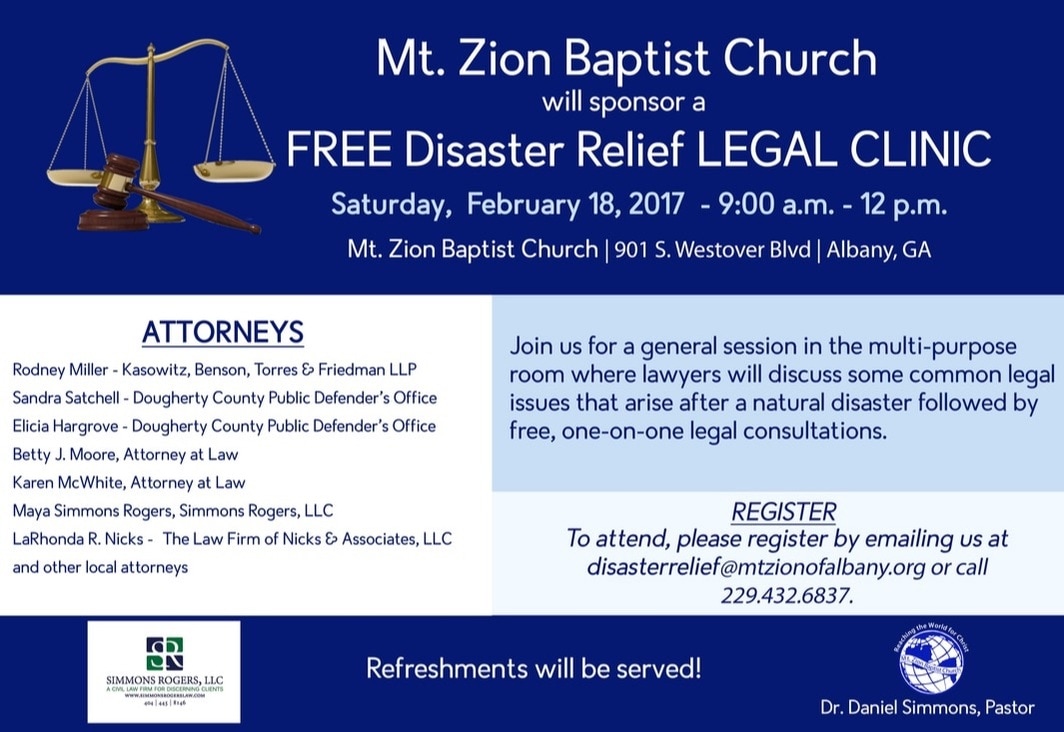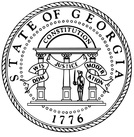Maya Simmons Rogers to Speak at CLE on Advising Directors and Officers on Corporate Governance7/17/2017 On Thursday, August 17, 2017, Maya Simmons Rogers, managing partner of the law firm Simmons Rogers, LLC, will present, along with attorneys Nefertara Clark, managing partner at Clark and Clark Law Group, LLC, John M. Gross, general counsel for Taylor English Duma LLP, and others at the National Business Institute’s (NBI) Continuing Legal Education (CLE) Seminar entitled “A Primer on Advising Directors and Officers on Corporate Governance” at the Cobb Galleria Centre in Atlanta, GA. Maya Simmons Rogers was invited to present because of her work with businesses, nonprofits, and their respective officers and directors.
The CLE will examine the duties and obligations of directors and officers and the liabilities associated with their roles. During the CLE, Maya Simmons Rogers will present on the “Fundamentals of Nonprofit Governance” and “Fiduciary Duties Under State Law: Nature and Scope.” She will provide invaluable tips and insights into how attorneys can be knowledgeable advisors of potential risks to their clients, help them identify issues proactively, and recommend policies and practices to minimize liability and maximize effectiveness. This CLE is designed for attorneys but founders, directors, officers, managers, presidents, vice presidents, accountants and paralegals will also benefit from the seminar. Those who attend the CLE will learn: 1. The baseline obligations of directors and officers; 2. How to keep their clients in compliance by fully understanding powers, duties, and liabilities under state law; 3. How to prepare their clients to safeguard against governance issues by examining top liabilities, including compensation issues, business transactions, intellectual property, contracts, and more; 4. How to stay up to date on initiatives, regulatory actions and new standards that affect tax-exempt organizations; 5. How to analyze the best practices and protocols for self-protection of directors and officers; and 6. Ways to gain a better understanding of Directors and Officers liability insurance, commonly referred to as D&O insurance, and exclusions to be wary of. Since 1983, NBI has been a national provider of continuing legal education and training. NBI is dedicated to providing practical, continuing legal education courses taught by experienced practitioners, so that attendees are equipped with information they can apply to their daily practice. To learn more about the seminar and register to attend, visit the NBI page here. The Firm Co-Sponsors A Free Disaster Relief Legal Clinic for South Georgia Tornado Victims2/11/2017 On Saturday, February 18th, the firm will co-sponsor a free legal clinic at the historic Mount Zion Baptist Church of Albany, Georgia from 9 am - 12 pm for those impacted by the tornado and recent storms in South Georgia. Our very own, Maya Simmons Rogers, a native of Albany, Georgia, and other volunteer lawyers from Atlanta and Albany will be providing helpful information as well as free one-on-one consultations regarding legal issues that have arisen as a result of the natural disasters. This event is free and open to the public.
To register please email your name and number of guests, if applicable, to [email protected] or call 229-432-6837. FOR IMMEDIATE RELEASE Simmons Rogers, LLC Announces Contract With Governor’s Office of Transition, Support and Reentry
ATLANTA, GA — Simmons Rogers LLC and its managing partner, Maya Simmons Rogers, recently announced a contract from the Governor of Georgia’s Office of Transition, Support and Reentry ("GOTSR"). The firm – in conjunction with Robert E. Keller, a former Clayton County, Ga. District Attorney – will assist the office in composing, clarifying and updating the policies and procedures of state agencies as they relate to reentering citizens. Read more about the GOTSR here. “We are excited about the opportunity that has been entrusted to our firm and we look forward to doing meaningful work on behalf of the Governor’s Office of Transition, Support and Reentry. We believe the decision to hire us is a testament to our work ethic and work product. Through this contract, we hope to help state agencies develop policies and procedures that will impact returning citizens in a positive way, reduce recidivism and forever transform Georgia into a safer, stronger state,” Rogers said. About Simmons Rogers, LLC: Simmons Rogers, LLC helps businesses and individuals navigate the inevitable legal mazes of life. The firm provides a wide range of professional legal services to businesses and individuals, not just in Atlanta, but throughout the State of Georgia and beyond. “We take pride in providing the quality of service and the level of representation you would expect from a large law firm at small firm rates,” Simmons Rogers said. About Maya Simmons Rogers: Ms. Rogers has created policies and procedures for private sector businesses and non-profits over the past decade. She spent several years working for local and national law firms based in Atlanta before launching Simmons Rogers, LLC. Read more here. About Robert E. Keller: Mr. Keller has nearly four decades of experience with Georgia’s criminal justice system. He has served as a Clayton County, Ga. District Attorney, on the Georgia Board of Pardons and Paroles and is the former Deputy Director of GOTSR. For more information about Simmons Rogers, LLC please visit our website. You may also contact the firm by phone at (404) 445-8146 or by e-mail at [email protected].  Courtroom battles can be lengthy and subject a business to lots of undesired publicity. Over the years, many businesses and individuals have decided to resolve their legal disputes using alternative dispute resolution ("ADR") methods such as mediation or arbitration. These methods are much quicker, private, and at times less costly than traditional litigation. In fact, if you were to review many of the contracts that you have entered into over the years, you would discover many businesses require disputes to be resolved using some method of ADR - typically arbitration. This post will cover the basics of arbitration and the impact of choosing arbitration over traditional litigation. For a discussion of mediation, please see our post, “The 411 on Mediation”. What is arbitration? Arbitration is an ADR method in which a neutral person, or a group of persons, selected by the parties renders a decision to settle a dispute after hearing each party’s side of the case and reviewing the evidence. How does arbitration work?
What is the arbitrator's role? The arbitrator is essentially the judge for the arbitration. However, unlike traditional litigation where the parties have little to no choice over which judge they get, the parties usually select the arbitrator. The arbitrator will preside over the proceedings, make rulings on briefs, resolve discovery disputes, settle evidentiary issues, evaluate the evidence presented, and then make a decision. You can choose whether the arbitrator issues a basic standard award, announcing only the outcome of the case, a reasoned award, explaining the arbitrator's reasoning behind the decision in addition to the decision itself, or a detailed award that includes findings of fact and conclusions of law in addition to the decision. Who can serve as an arbitrator? Anyone can serve as an arbitrator provided they have the requisite training or certification required by his or her respective state, country, or industry association. Typically, arbitrators are former judges, lawyers, or a professional with particular knowledge of the facts involved in the case. What are the benefits of arbitration?
What are the risks of arbitration?
Arbitration vs. Mediation The goal of arbitration is for a third party to reach a decision for the parties involved in a case, while the goal of mediation is for the parties to resolve the case themselves. In arbitration, the decision is made entirely by the arbitrator. On the other hand, in mediation the mediator hears each party’s side of the case and then assists the parties in negotiating with the hopes that the parties can reach a settlement. It is possible that parties will participate in a mediation, fail to reach a resolution, and then engage in arbitration regarding the same dispute. Deciding whether to litigate, mediate, or arbitrate can be difficult. There are benefits and risks with all three. If you would like to discuss your legal matter and the various avenues available for resolution, or you are looking for an experienced neutral to serve as either an arbitrator or mediator for your case, please do not hesitate to contact Simmons Rogers, LLC at 404-445-8260 or [email protected].  The summer is fast approaching and perhaps you are considering hiring summer interns for your business. Why not? Hiring summer interns is a great business strategy. Summer interns are a great way for your business to increase its recognition in the marketplace, recruit future talent, liven up your workplace, and provide your current employees with an opportunity to gain experience serving as a mentor and a manager. However, there are some legal risks involved with hiring interns. Whether your interns are paid or unpaid, many of the legal risks associated with traditional employees also apply, including, for example, anti-discrimination laws. When it comes to unpaid interns, violating the Fair Labor Standards Act (FLSA) is one of the biggest risks for "for-profit" businesses. Internships at "for-profit" businesses will typically be viewed as employment, unless the internship is deemed exempt by the U.S. Department of Labor. To ensure that your business' internship program is exempt you must make sure the program is properly structured. The 6-point test for determining if an unpaid internship program is exempt from FLSA's requirement to pay interns a minimum wage and overtime, according to the U.S. Department of Labor, is as follows:
In addition to federal laws, your business must also consider what state laws apply to the internship. Check out this list of cases, summarizing internship-related lawsuits filed over the past 3 years. While you cannot prevent lawsuits, you can increase the likelihood of your business winning a lawsuit. So, remember unpaid internships are not meant to be free labor for your business. Before you bring on your interns this summer, make sure you have a formalized internship program that complies with both federal and state laws. Once you have written down the details of your internship program make sure you have them reviewed by both your human resources department and an attorney.  Mediation is an effective way to resolve any type of dispute; from squabbles between neighbors to large claims worth millions of dollars. Differences that cannot be resolved between the parties can lead to expensive, time consuming, public battles that involve lawyers and courts - unless alternative dispute resolution (ADR) methods, like mediation, are utilized. Mediation is a great way for businesses and individuals to resolve problems. Even after a lawsuit has been initiated, mediation is a practical way of reaching an agreement that could end the lawsuit. As long as the parties involved in the dispute are willing to meet to discuss the issues separating them, it is likely that a mutually agreeable settlement can be reached. What is mediation? Mediation is an opportunity for a mediator to facilitate a mutually acceptable settlement agreement between the parties involved by offering the parties an opportunity to:
What is the role of a mediator? A mediator is a third party neutral that will find points of agreement between the parties and facilitate movement towards a mutually decided upon agreement. A mediator should not dictate the decision, but instead help the parties develop their own resolution. What is the benefit of mediation? Mediation has several benefits that make it more beneficial than arbitration and litigation in certain contexts:
Once the parties agree on dates, mediations can be scheduled quickly. Remember, the advantages of mediation over litigation include privacy, reduced legal fees, control over the outcome, control of the process, a chance to salvage relationships, and control of your most important asset - your time. Simmons Rogers, LLC provides mediation services throughout Georgia, in all 50 states, and internationally. Contact us to learn more about our services or to schedule your mediation. Online scheduling is also available. |
Simmons Rogers, LLCSimmons Rogers, LLC is a full- service civil law firm based in Atlanta, Georgia. We provide legal services as well as mediation and arbitration services, to businesses and individuals throughout the state of Georgia and beyond. Archives
January 2018
Categories
All
This blog is not intended to be a complete explanation of the law. Its purpose is to inform, not to advise on any specific legal problem or legal rights. If you have specific questions regarding any topic in this blog, you are encouraged to consult the Atlanta based law firm of Simmons Rogers, LLC or an attorney licensed in your
state. |

Simmons Rogers, LLC
4045 Orchard Rd SE, Suite 210 Smyrna, Georgia 30080 Phone: 404-445-8146 Fax: 404-445-8226 E-mail: [email protected] |
LEGAL DISCLAIMER
The information on this website is for informational purposes only and is not legal advice. Use of this website does not create an attorney-client relationship between you and Simmons Rogers, LLC. You should not act upon the information within this website without seeking advice from a lawyer licensed in your own state or country. You should not send any confidential information to Simmons Rogers, LLC until and unless a formal lawyer-client relationship has been established in writing. Unless you have received such written confirmation, we will not consider any correspondence you send us as confidential. |
© 2013-2018. All Rights Reserved. Simmons Rogers, LLC
Attorney Advertising. The choice of a lawyer is an important decision and should not be based solely upon advertisements.
Privacy Policy
Attorney Advertising. The choice of a lawyer is an important decision and should not be based solely upon advertisements.
Privacy Policy




 RSS Feed
RSS Feed